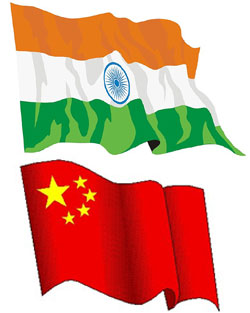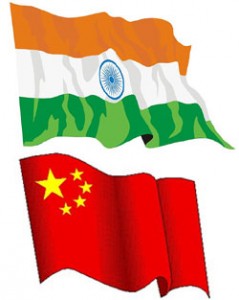by Bijesh Krishnadas
[box]Look at the shelves in supermarkets around the world. Every other product on display wears the “Made in China” tag. Where does India stand?[/box]Recently, Bob Cringely, a tech writer, posted an interesting viewpoint on his blog – that it is India that will be the next superpower and not China as many believe. Perhaps, his article was doling out sarcasm and was not a serious argument in support of India becoming the powerhouse of the century. Set aside your patriotic cloak for a few minutes and ask yourself whether India does have an edge over China in the upcoming struggle for power.
The Chinese Edge
During the past decade, we have tended to ignore China as competition on account of our command over the English language. Right now though, China seems to have the last laugh. China has had a few miraculous decades and is fast emerging as an industrial powerhouse. The last century saw the U.S. gaining its superpower tag through ginormous industrialization and innovation. China is on the brink of replicating this feat with pure willpower and stamina and perhaps forced labour. Look at the shelves in supermarkets around the world. Every other product on display wears the “Made in China” tag. Where does India stand? The odd bath mats are the only items I see with the “Made in India” tags. Bath mats and undergarments.
Yes, China continues to churn out fakes and low-quality, cheap goods but you would be surprised at how consumers are buying up these cheap products over and over again without inhibition. The key attribute here is that they are so cheap that you can afford to replace them once every few months. The Chinese factories, in turn, rake in the revenues from repeat sales.
Talking of quality – guess where those shiny iPhones that the whole world lusts after are made? Shenzhen, China. Shenzhen was the first and the most successful of China’s SEZs. A majority of the world’s high-tech equipment are made by Chinese companies and these rank very high up in terms of quality as well. What does this prove? Although we relate China to cheap low-quality products, China is equally adept and successful at manufacturing high quality and high-tech devices and products. They also do it at a very cheap price, which is why companies flock to China to manufacture their market leading products.
Tapping Natural Resources
While expanding its industrial and manufacturing prowess, China has also been shrewd to look at servicing the demands that such expansion sets forth. Yes, the demand for oil, power and mineral resources. China is slowly but steadily building up its stakes on natural resources in Africa.
Africa continues to be a troubled continent with its faction wars and military governments. Very few companies are willing to take the risk of setting up shop in Africa. As a result, there is lesser competition from international oil and mining companies. The Chinese government was smart enough to take advantage of this situation and has been encouraging its oil companies to expand operations and acquisitions in Africa. China already has vast oil investments in Nigeria and Sudan. The country also has the unique advantage that its oil companies are almost entirely controlled by the government. This means they don’t have to bother themselves with shareholder concerns – financial, humanitarian or otherwise. And it’s not just Africa that China has set its sights on. Chinese companies continue to build their portfolio across the world. While they take the “from-scratch” approach in Africa, in other parts of the world, including Australasia, Chinese companies are taking the acquisition route. In 2009, a Chinese company (Yanzhou) made a 3.2 billion US Dollars takeover bid for Felix – an Australian mining company. It was one of the biggest deals by a Chinese company in Australia. Since then there have been a number of other takeover bids that are in various stages of the process.
What about India?
Where does India stand in the natural resources game? The Iran-India oil pipeline remains a pipe dream. The future of this project now rests with Pakistan – the neighbour we are quarrelling with over a piece of land. Whatever mineral resources India does have are being siphoned out of the country by our elected representatives. Does the term “illegal mining” ring a bell?
In the name of privatization, we have also opened up our public sector oil and mining companies to the stock market. It would appear that a large stake in each of these companies is now in foreign hands through the QIB route. ONGC and Reliance have made significant investments in overseas oil projects but there aren’t enough results to judge if India will succeed in sourcing all of its energy needs.
India’s economy is booming and the growth stories out of industries are awe-inspiring. The stock market has held itself up against the recent economic upheavals quite well. We are well on our way up in economic terms. Yet, India does not have the strength to wield the super-power status the way China can.
Of course, I don’t condone China’s labour practices or its closed governance. We can’t go down that path but we should try emulating the results that their practices bring out – that of a united front to the world. We can’t continue squabbling over non-issues like race, creed and religion. We can’t have political parties openly assaulting the same migrant workers that keep the economy booming.
The Indian Edge
China’s humanitarian excesses could well be its undoing. The anger and the frustration brimming within Chinese factories are waiting to explode. China has realised this and is working its way to patching itself up but they are making very slow progress. This is where India has its edge. We are to the world a democracy and one without too many a dark secret . India should use this image to its advantage and bring more business from around the world.
India needs to get its act together – that’s the need of the hour. Alongside the pretty economic picture, we need the support of an undivided nation to get there. Our country needs to take a long hard look at where it’s headed and make arrangements in terms of resources and infrastructure to sustain the future.
[facebook]share[/facebook] [retweet]tweet[/retweet]






